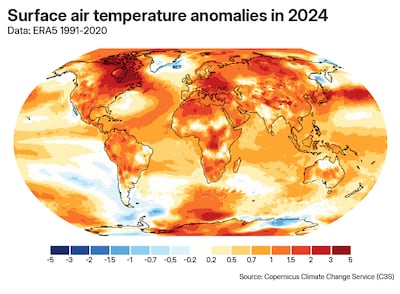Earth’s temperature remained 1.5°C above the pre-industrial average in 2024, representing the first calendar-long breach of the milestone on record.
Copernicus, EU's climate change monitoring service, said the global temperature average of 15.10°C was 0.12°C above 2023's level, the previous warmest year. It was also 1.60°C higher than the temperature estimate for the pre-fossil fuel era, from 1850 to 1900.
Scientists said the figures suggested it was now “very likely” the world would fail to reach its 2060 global warming targets.
Akshay Deoras, a research scientist at the National Centre for Atmospheric Science and the Department of Meteorology at the University of Reading, told The National that the milestone showed humanity was “treating our planet like a credit card with no limit”.
“The annual global temperature crossing the 1.5°C mark for the first time in 2024 shows the bill is coming, which unfortunately could lead to a further increase in the frequency and intensity of extreme weather events across the globe,” Mr Deoras said.
To breach the 2015 Paris Agreement, the average global temperature over a period of at least 20 years must exceed the temperature recorded during the pre-industrial period by at least 1.5°C, he added.

“Whilst we are yet to breach the Paris Agreement, several consecutive months since summer 2023 have been warmer by at least 1.5°C, showing how serious the problem of global warming is," he explained. "The more often 1.5°C threshold gets breached, the closer we would be to the breaching of the Paris Agreement.
“We're already seeing homes become uninsurable and disasters costing billions. This isn't about future generations any more – it's about us, today. We are on track to see new warming records getting broken, unless we immediately cut down the emission of greenhouse gases."
Another report released on Friday by the UN's World Meteorological Organisation, which synthesised data from six regional climate monitoring institutes, found that the years from 2014 to 2024 were the 10 warmest on record.
“Today’s assessment from the World Meteorological Organisation proves yet again global heating is a cold, hard fact,” UN Secretary General Antonio Guterres said.
The UN chief called on world governments to “act now” and submit updated national climate plans for 2025 as well as supporting those most affected by severe climate impacts.
But “individual years pushing past the 1.5-degree limit do not mean the long-term goal is shot. It means we need to fight even harder to get on track," he added.
WMO secretary general Celeste Saulo said it is “essential to recognise that every fraction of a degree of warming matters”.
She added: “Whether it is at a level below or above 1.5°C of warming, every additional increment of global warming increases the impacts on our lives, economies and our planet.”
During the first half of last year, which was the world's hottest on record, each month registered higher readings than the same month in any previous year. That led to a 13-month streak of record temperatures.
Global temperatures remained significantly above average in the second half of last year. The world set a record daily global average temperature of 17.16°C on July 22.

It was the warmest year for all continental regions, except Antarctica and Australasia, as well as for sizeable parts of the ocean, particularly the North Atlantic Ocean, the Indian Ocean and the western Pacific Ocean.
Around Antarctica, sea ice reached record or near-record lows during a large part of the year, while in the Arctic, the sea ice extent was relatively close to its 1991 to 2020 average until July, but fell well below average in the following months. At its annual minimum in September, levels were fifth lowest in the satellite record.

Carlo Buontempo, director of the Copernicus Climate Change Service, said he was “running out of metaphors” to explain the warming.
“The many record breaking events that we have seen over the course of the last 12 months are not statistical oddities, but rather a direct consequence of the generalised warming of our climate system,” he said. “The underlying physics is very clear. A warmer global climate produces more frequent and intense events, such as for example, heatwaves. A warmer atmosphere also holds more moisture, leading to heavier rainfall, where warmer seas amplify the potential for destructive storms."
The Paris Agreement’s long-term goal to limit global warming to 1.5°C above pre-industrial levels was chosen to avoid the most severe effects of climate change, albeit with more common extreme heatwaves and drought compared with today. Under this scenario, the world is expected to exceed 1.5°C from 2030, before dropping below 1.5°C by 2060.
Samantha Burgess, strategic lead for climate at Copernicus, said on Thursday that 2024’s milestone meant it was “very likely” the world would miss the target.
“Given that we have had our first calendar year of 1.5ºC, there is an extremely high likelihood that we will overshoot the long-term average of 1.5ºC and the Paris Agreement limit," she said.
“However, my personal opinion is that this is an extraordinarily important policy that all countries around the world have committed to, so I don’t think it’s fair to say the Paris Agreement is dead. And I think if we do overshoot 1.5ºC, which has a high probability associated with it, the next target does not automatically deflect to 2ºC, but the next target becomes 1.51ºC. And the sooner we get to net-zero emissions, the sooner we will stabilise our climate and reduce the potential impacts of future extreme events.”

Worsening warming
According to the Carbon Brief, if warming exceeds 1.5°C beyond 2100 and peaks at 1.89°C, sea levels will rise by 20cm at more than 70 per cent of the Earth's coastlines.
If warming continues to rise, peaking at 2.69°C by 2100, the world would pass a catastrophic point of no return, with the loss of all ice sheets, sea level rises of several metres, extreme heatwaves occurring most years and the drying out of the Amazon rainforest.
Warming of 4°C would result in unprecedented heatwaves, severe drought and major flooding, creating millions of global climate refugees. Wide-scale adaptation to global sea rise would also be necessary.
Adla Massoud contributed to this report from the United Nations


